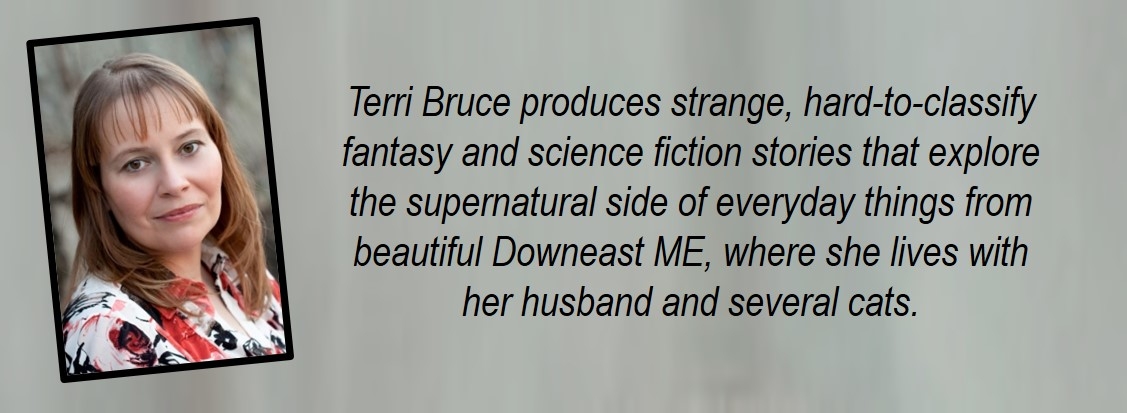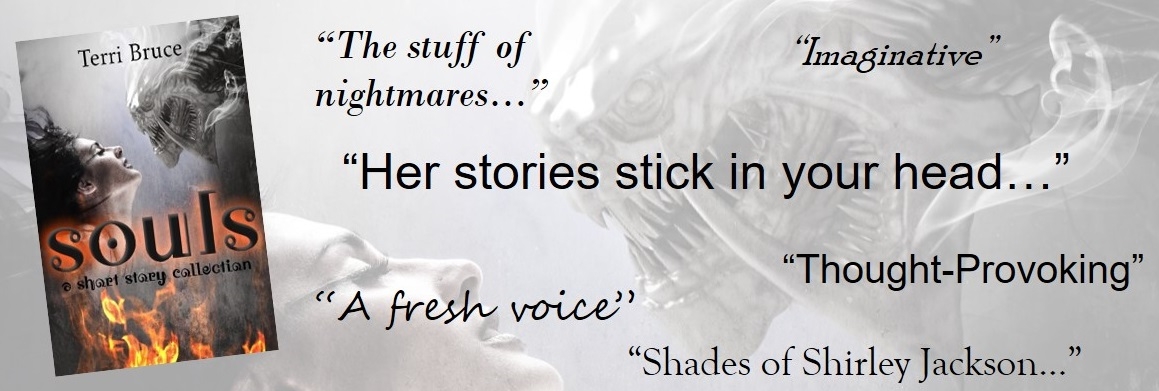July 5th Update on Publishing Dispute
Latest update (September 10th) can be found here
July 5th Update
Updated July 16th with links to other authors involved in disputes with Damnation Books/Eternal Press, edited the grammatical and typographical mistakes examples to be in the "my verison/their version" format like the other examples, and turned comments on (not sure why they weren't on before).
I want to thank everyone for their continued support while I work to resolve the issues with Thereafter. Until now, I had hoped that the publisher and I would reach an amicable solution—after all, I assumed that the publisher and I both wanted the same thing: to publish a good book. However, the most recent correspondence from the publisher makes it clear that this is not the case. This dispute will have to go to court to be settled.
So…what, exactly, happened?
Well, basically, when I received the final proof copy of Thereafter on April 28th (for a May 1st release date) from the publisher (Eternal Press, a division of Damnation Books), it was riddled with errors that had been inserted by the publisher during the proofreading stage. In addition, the publisher had made quite a few substantial changes to the voice/tone/style of my writing, changes that were never discussed with me and certainly not approved by me.
In short: The final/publisher's version of Thereafter make me sound like an illiterate git.
Every book has a few errors. That’s just life. However, Thereafter has 194 errors and 84 erroneous changes. Let me repeat that: THEREAFTER HAS TWO HUNDRED AND SIXTY THINGS WRONG WITH IT…in a 252 page book.
164 of these errors are formatting errors. Most of these were lost italics for things like:
internal thoughts, such as in the following sentences (all examples presented as they appeared in the published version of Thereafter):
· God, I really am an idiot. (should read: God, I really am an idiot.)
· You idiot, she chided herself. What the hell is wrong with you? Of course you’re not alone. It’s not like you’re the only person who ever died. (should read: You idiot, she chided herself. What the hell is wrong with you? Of course you’re not alone. It’s not like you’re the only person who ever died.
· She sighed and tried to focus on the positive. Okay, don’t give up. Other people manage to find their way and they don’t have maps. (should read: She sighed and tried to focus on the positive. Okay, don’t give up. Other people manage to find their way and they don’t have maps.)
· Irene’s heart jumped. I’m still connected to the land of the living! I’m connected to my grave! Well, more likely, not so much the grave as the body buried in it. (should read: Irene’s heart jumped. I’m still connected to the land of the living! I’m connected to my grave! Well, more likely, not so much the grave as the body buried in it.)
and lost emphasis, such as:
· “It’s six dimes,” Amy retorted. (should read: “It’s six dimes,” Amy retorted.)
· “Don’t start,” she said. (should read: “Don’t start,” she said.)
though the italics were stripped from things like the names of ships, television shows, movies, books, and magazines, as well.
The formatting issues also include layout issues, such as:
(their version):
A: It depends on your point of view.
Irene grunted. Yes, she thought sourly. It really did.
Q: Why haven’t I crossed over?
(should be formatted as):
A: It depends on your point of view.
Irene grunted. Yes, she thought sourly. It really did.
Q: Why haven’t I crossed over?
And the mis-formatting of this letter between two of the characters (which makes the letter look like dialog) – WARNING: this example contains BIG spoilers, so I’ve hidden it. Highlight the white space below to reveal the text. If you don’t want any spoilers, then skip this example:
(their version):
Instead, she said, “Jonah. How is school? Tell me you’re going. How are things at home? Are you still in trouble for skipping school? I really need to know that you’re okay.
“To answer your question about Charon—I don’t know if he’s just a guy or what; the stories about him requiring payment to take you across the river are true. Unfortunately, I—and about a
billion other people—didn’t bring any coins (fine, you were right. I should have hung onto my coins). We’re all stuck here. Please send me pennies or dimes, as many as you can get your hands on
(do not rob a bank or anything like that! Just send whatever you can find).
"~Irene”
(which should be formatted as):
Instead, she said,
Jonah,
How is school? Tell me you’re going. How are things at home? Are you still in trouble for skipping school? I really need to know that you’re okay.
To answer your question about Charon—I don’t know if he’s just a guy or what; the stories about him requiring payment to take you across the river are true. Unfortunately, I—and about a billion other people—didn’t bring any coins (fine, you were right. I should have hung onto my coins). We’re all stuck here. Please send me pennies or dimes, as many as you can get your hands on
(DO NOT ROB A BANK OF ANYTHING LIKE THAT! Just send whatever you can find).
~Irene
There are three instances of letters misformatted in this way, the most egregious of which is the climatic emotional scene of the book. The letter in question is intercut with a character’s internal thoughts, showing the struggle between what the character is writing versus what the character is thinking. Unfortunately, the internal thoughts were not offset (in the published version) from the letter/written passages, making the scene incomprehensible and ruining the climax of the book. :-( In the hope that Thereafter might someday see the light of day, I’ve opted not to show you this passage because it contains major spoilers. However, that formatting mistake alone would be enough for me to call for a boycott of the book by readers and to sue the publisher to force its correction.
Thereafter also contains 21 typographical mistakes (11 inserted by Eternal Press when they went to “fix” other things), such as:
Their version: His mocking words had put her on edge. However, since She had no
My version: His mocking words had put her on edge. However, since she'd had no
Their version: Whenever Ian tried to kiss her, She had the same feeling as She
My version: Whenever Ian tried to kiss her, she'd had the same feeling as she'd
Their version: Samyel had seemed interested in it, and She had the impression
My version: Samyel had seemed interested in it, and she'd had he impression
Their version: the empty, aching feeling She had when it had left her.
My version: the empty, aching feeling she'd had when it had left her.
Plus, 8 grammatical mistakes (6 of which were inserted by Eternal Press when they went to “fix” other things), such as:
Their version: It only been a few—days? weeks?—since she’d been here.
My version: It had only been a few—days? weeks?—since she'd be here.
Their version: She only known him a few weeks
My verison: She'd only known him a few weeks
Their version: that he spoke only truth, only her best interests at heart
My version: that he spoke only truth, had only her best interests at hear
Their version: It couldn’t be. Already? It only been a few hours.
My version: It couldn't be. Already? It had only been a few hours.
All of the items in the above categories are clearly errors and show that the publisher did not perform adequate proofreading services as provided for in our contract. That’s 194 obvious, undisputable errors (in a 252 page book).
In addition, Thereafter contains 84 changes to the voice/style of the work and/or meaning of the sentences that were made by the proofreader. These include:
Their version: Irene looked down. The cat stared at her.
My version: Irene looked down. The cat was staring at her.
If I had meant that the cat started staring at Irene the moment she looked down, I would have written the sentence the way EP did. However, what I meant, which is what I wrote, is that the cat was already staring at Irene, before she looked down. In the first sentence, the cat stares at Irene in reaction to her looking at it. In the second, Irene looks at the cat in reaction to it staring at her.
Another example:
Their version: “How did that make you feel?”
My version: “And how did that make you feel?”
In the EP version, the sentence reads as very serious. In my version, starting the sentence with “And” implies that the question is a joke, mocking, or tongue-in-cheek. It’s a subtle clue to the reader that the speaker is mocking a clichéd convention.
Their version: He chuckled softly. “No. And yes…mostly no. I am all things.
My version: He chuckled softly. “No. And yes…but mostly no. I am all things.
Again, the “but” in my version serves to soften the speaker’s response. The EP version comes across as curt or decisive. My version is meant to indicate the words are spoken gently, with less decisiveness.
Another example:
Their version: No; there was none of that.
My version: But no, there was none of that.
Again, the beginning conjunction in my version softens the words, shows less decisiveness. In addition, the first sentence in my version is an internal thought of the main character. The EP version reads more as coming from an impartial/omniscient narrator.
Another example:
Their version: She had a great job
My version: She’d had a great job
The use of the simple past in the EP version indicates that Irene currently has a good job. The use of the past perfect in my version indicates that Irene used to have a great job (back before she died).
My contract with EP stipulates that they may make no changes without my approval; they didn’t have my approval to make these changes. Seems simple enough. However, EP is arguing that these changes are not “major” changes and that the contract language only refers to changes made during the “editing” phase, not the proofreading phase (the contract makes no such distinction). It will be up to a judge to decide if I have the authority to reject these 84 style/voice changes or not.
Regardless of that, EP was well aware of the formatting issues with the book before they published it. They were aware of those issues when they sent me the final proof on April 28th (the CEO is the one that told me about them when she sent the proof and asked me to review the formatting issues specifically), but they still published the e-book version on May 1st, even though they knew I was in the process of preparing an errata for the formatting issues. It was during that process that I discovered the typographical and grammatical errors inserted by EP while they were making the voice/style changes, and I informed EP of such via email. However, EP, despite knowing of these flaws, refused to grant me the extra NINE days I requested to produce the errata and published the e-book for expanded distribution and the print book on May 12th.
Since Eternal Press has released the book with all of these mistakes (and claims that my assertions that these errors constitute a breach of contract is a hysterical over-reaction) and continues, repeatedly, to refuse to fix the book, I now have no choice but to file for an injunction to stop distribution of the book and file suit for breach of contract. This is a long, expensive, time-consuming process. I’m annoyed I have to do this.
But you know what annoys me even more?
The publisher’s lack of professionalism and ruining of a perfectly good working relationship. Up until now, I had been very happy with Eternal Press. It turns out, however, that EP has much in common with the girl with the curl in the middle of her forehead: when it’s good, it’s very good, and when it’s bad, it’s horrid. Unfortunately, I can no longer recommend Eternal Press as a publisher based on this experience, which I’m sad to say, is apparently not an isolated incident (see this from Tim Marquitz and this from Mark Ward Hall).
You know what else annoys me? That Eternal Press doesn’t care enough about its authors (or its readers) to want to keep them happy. I’m unhappy about the final quality of my book. It wouldn’t take that much effort for EP to fix the book. If for some insane reason that wasn’t possible, then their next question should be “what can we do to make this better?” That’s customer service. That’s professionalism. That’s good business. However, EP’s attitude—not just to me but to EVERY author who has been in this same exact position—and there are quite a few—has been basically “go screw yourself.” Complaints such as mine are labeled whiny, hysterical, and “emotional” (oh yes she did!). A gross over-reaction by overly sensitive, high-strung artistic types. In fact, EP is so sick of so many whiny, demanding authors, they have now declared they will no longer provide their authors with a final proof copy because too many of us are “abusing” it, by asking for “rewrites” at the nth hour. Since when is wanting an error free book that says what I meant it to say being “emotional” or demanding? Since when is asking for glaring grammatical and formatting mistakes to be fixed asking for a major “rewrite”?
You know the third thing that annoys me? Being told to sit down and be quiet. No, I won’t be quiet. No, I will not give up my right to discuss things that are about ME, that are happening to ME, that involve MY life, my work, my well-being, my health, and my welfare. No, I absolutely won’t. I have never seen such a thick veil of secrecy as the one that exists in the publishing world. Authors subtlety and overtly intimidated into keeping quiet, for fear they will hurt their careers or reputations, that they will be “black listed” within the industry, that agents or publishers won’t want to work with them if they make a stink about abusive or shady practices. Bullshit! I especially like the part where the publisher said I was hurting my reputation more than I was hurting theirs (by speaking out). Gee, thanks for the concern about my reputation; really, I’m touched. However, having a book that makes me look like an illiterate git out in the world is a lot more damaging to my reputation than sharing a few basic facts about an ongoing dispute with the publisher, so, thanks, anyway, but I think I’ll continue to talk about this situation to my heart’s content.
So, that’s the situation. Thank you all for your ongoing support--I can't tell you how much it means. I’ll keep you apprised as things develop, though this situation is probably not going to be resolved quickly.





